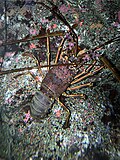| Image | Name | Common name | Distribution |
|---|
 | Panulirus argus (Latreille, 1804) | Caribbean spiny lobster | western Atlantic Ocean |
 | Panulirus brunneiflagellum Sekiguchi & George, 2005 | | Ogasawara Group (Bonin Islands) of southern Japan |
 | Panulirus cygnus George, 1962 | western rock lobster. | west coast of Australia |
 | Panulirus echinatus Smith, 1869 | brown spiny lobster | tropical western Atlantic Ocean and central Atlantic Islands. |
 | Panulirus femoristriga (von Martens, 1872) | stripe-leg spiny lobster | Indo-Pacific. |
 | Panulirus gracilis Streets, 1871 | green spiny lobster | Eastern Pacific: From Baja California Sur to the west coast of Peru and the Galapagos Islands. |
 | Panulirus guttatus (Latreille, 1804) | spotted spiny lobster or Guinea chick lobster | western Atlantic Ocean and the Caribbean Sea. Its range extends from Bermuda, the Bahamas, southern Florida and the West Indies, to Curaçao, Bonaire, Los Roques and Suriname |
 | Panulirus homarus (Linnaeus, 1758) | | coasts of the Indian and Pacific Oceans |
| Panulirus inflatus (Bouvier, 1895) | blue spiny lobster | Eastern Central Pacific: Mexico. |
 | Panulirus interruptus (Randall, 1840) | California spiny lobster | eastern Pacific Ocean from Monterey Bay, California to the Gulf of Tehuantepec, Mexico. |
 | Panulirus japonicus (von Siebold, 1824) | Japanese spiny lobster | the Pacific Ocean around Japan, China, and Korea. |
| Panulirus laevicauda (Latreille, 1817) | smoothtail spiny lobster | Western Atlantic |
 | Panulirus longipes (A. Milne-Edwards, 1868) | longlegged spiny lobster | tropical Indo-Pacific |
 | Panulirus marginatus (Quoy & Gaimard, 1825) | | Hawaiian Islands |
| Panulirus meripurpuratus (Giraldes & Smyth,2016) | | Pernambuco state, northeastern coast of Brazil. |
 | Panulirus ornatus (Fabricius, 1798) | tropical rock lobster, ornate rock lobster, ornate spiny lobster and ornate tropical rock lobster | Indo-Pacific, from the Red Sea and KwaZulu-Natal in the west to Japan and Fiji in the east |
 | Panulirus pascuensis Reed, 1954 | Easter Island spiny lobster | Easter Island and the Pitcairn Islands in the Pacific Ocean |
 | Panulirus penicillatus (Olivier, 1791) | variegated crayfish, tufted spiny lobster, spiny lobster, Socorro spiny lobster, red lobster, pronghorn spiny lobster, golden rock lobster, double spined rock lobster and coral cray | tropical Indo-Pacific region |
 | Panulirus polyphagus (Herbst, 1793) | mud spiny lobster | tropical Indo-Pacific region. |
| Panulirus regius De Brito Capello, 1864 | royal spiny lobster | Eastern Atlantic and the Mediterranean |
| Panulirus stimpsoni Holthuis, 1963 | Chinese spiny lobster | Indo-West Pacific |
 | Panulirus versicolor (Latreille, 1804) | painted rock lobster, common rock lobster, bamboo lobster, blue lobster, and blue spiny lobster | western Pacific and the Indian Ocean |
|

















